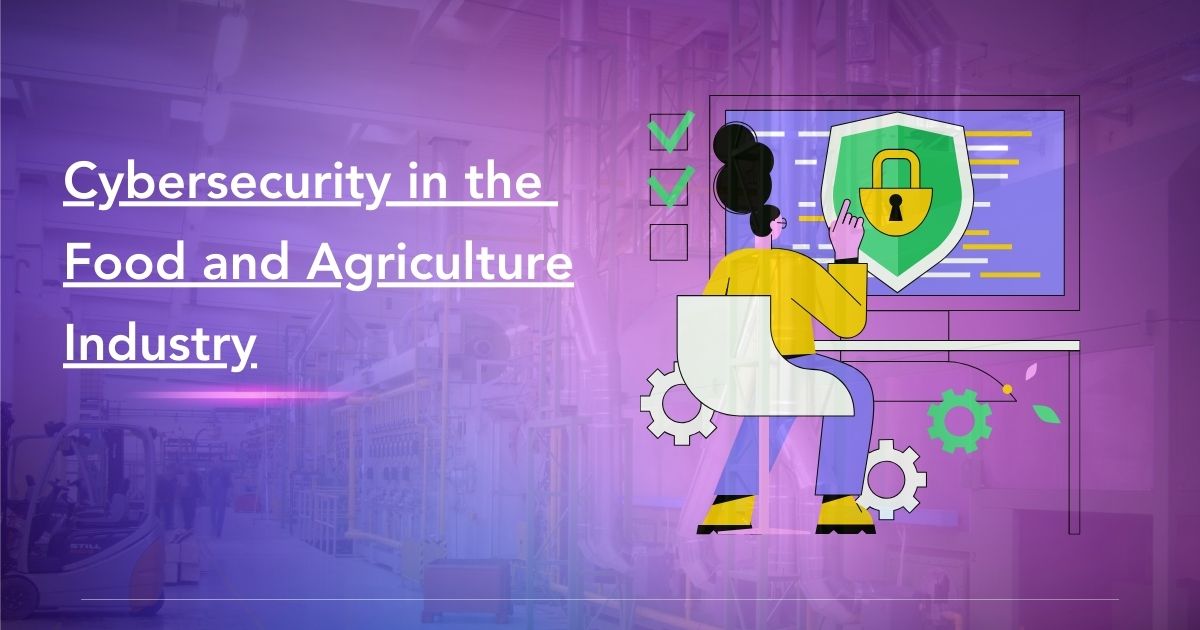In today’s interconnected world, the food and agriculture industry is increasingly reliant on technology and data. With this growing reliance comes an escalating threat of cyberattacks that can have detrimental impacts on the global food supply chain. This article aims to delve into the crucial role of cybersecurity in protecting our plates from potential disruptions and ensuring the integrity of the food and agriculture industry.
Understanding the Food and Agriculture Industry
- The backbone of global food productionThe food and agriculture industry serves as the backbone of global food production, providing sustenance to billions of people worldwide. From farming to food processing, this industry works tirelessly to ensure a steady supply of food and nourishment for populations across the globe.
- The reliance on technology and data in modern farming practicesModern farming practices heavily rely on technology and data-driven solutions to enhance productivity and efficiency. From precision agriculture techniques to automated systems and IoT devices, the industry embraces technological advancements to meet the increasing demand for food. However, this reliance also exposes vulnerabilities that cybercriminals can exploit.
Vulnerabilities and Threats in Food and Agriculture
- Rise in cybercrime targeting the industryJust as the food and agriculture industry becomes more technologically advanced, cybercriminals are becoming more sophisticated in their methods. The sector has witnessed a rise in cybercrime targeting everything from financial transactions to the manipulation of critical infrastructure. This evolving threat landscape poses a significant risk to the integrity of the entire food supply chain.
- Identifying potential vulnerabilities in the supply chainThe interconnected nature of the food supply chain makes it susceptible to cyber threats at various points. From farm to fork, every link in the chain presents potential vulnerabilities that cybercriminals can exploit. These vulnerabilities include everything from insecure data storage systems to outdated software on automated machinery.
Cybersecurity Challenges in Food Production
- Securing automated systems and IoT devices on farmsAs technology becomes more integrated into farming practices, ensuring the security of automated systems and IoT devices becomes paramount. These technologies control crucial processes such as irrigation, fertilization, and monitoring. Securing them against unauthorized access and malicious activities can significantly reduce the risk of cyber attacks on agricultural operations.
- Ensuring resilience against ransomware and data breachesThe threat of ransomware and data breaches looms over the entire food production landscape. From capturing vital farm data to holding entire systems hostage, ransomware attacks can disrupt operations and compromise the integrity of the food supply chain. Implementing robust security measures, regular data backups, and incident response plans are essential to mitigate the impacts of such attacks.
Protecting the Food Supply Chain
- Securing transportation and logistics networksThe food supply chain relies heavily on efficient transportation and logistics networks. However, these networks are increasingly vulnerable to cyber threats such as supply chain attacks and unauthorized access to transportation systems. Implementing secure communication protocols, encrypting data, and conducting regular security audits can help safeguard the flow of goods from farm to consumer.
- Addressing concerns regarding third-party suppliers and partnersThe interconnected nature of the food and agriculture industry means that various third-party suppliers and partners play critical roles in the supply chain. However, these external entities can also introduce vulnerabilities that cybercriminals can exploit. Conducting thorough security vetting of suppliers, implementing secure data exchange protocols, and enforcing contractual obligations for cybersecurity standards are essential for minimizing these risks.
Data Privacy and Intellectual Property Protection
- Safeguarding sensitive data and trade secretsThe food and agriculture industry deals with an extensive range of sensitive data, including customer information, proprietary formulas, and trade secrets. Protecting this information from unauthorized access, data breaches, and intellectual property theft is crucial. Implementing strong encryption, regular security assessments, and access control measures can help preserve the integrity and confidentiality of sensitive data.
- Challenges of protecting intellectual property in research and developmentResearch and development activities in the food and agriculture industry involve substantial investments and efforts to drive innovation. Protecting intellectual property related to new crop varieties, farming techniques, or proprietary machinery designs is paramount to maintain a competitive edge. Implementing robust patent protection strategies and secure data management protocols can help safeguard these valuable assets.
Regulatory Frameworks and Industry Standards
- Overview of existing regulations and guidelinesVarious existing regulations and guidelines address cybersecurity in specific industries. However, the food and agriculture sector lacks comprehensive and industry-specific regulations to address its unique challenges adequately. Collaborative efforts between governmental bodies, industry organizations, and cybersecurity experts are required to develop appropriate regulatory frameworks that mitigate cyber risks effectively.
- The need for industry-specific cybersecurity standardsGiven the distinct nature of the food and agriculture industry, establishing industry-specific cybersecurity standards is essential. These standards can help provide clear guidance on best practices, control frameworks, and risk management approaches tailored to the unique needs of the sector. They can enable organizations to align their cybersecurity efforts with industry-wide benchmarks and enhance their overall resilience against cyber threats.
Building a Culture of Cybersecurity
- Training and awareness programs for employeesHuman error remains one of the most significant factors contributing to cyber vulnerabilities in any industry. Implementing comprehensive training and awareness programs can help educate employees about cybersecurity best practices, the potential threats they may encounter, and the importance of maintaining a vigilant approach to data security. Regular training sessions, simulated phishing exercises, and ongoing communication are effective tools in building a culture of cybersecurity.
- Stakeholder collaboration to promote cybersecurity best practicesPromoting cybersecurity best practices requires collaboration among all stakeholders involved in the food and agriculture industry. This includes farmers, processors, distributors, governmental agencies, industry associations, and cybersecurity experts. By sharing knowledge, collaborating on threat intelligence, and fostering open communication channels, stakeholders can work together to address cybersecurity challenges and strengthen the industry’s overall resilience.
Incident Response and Recovery Strategies
- Developing effective incident response plansIn the face of cyber incidents, having well-defined and tested incident response plans is critical. These plans outline steps to detect, contain, and mitigate the impact of cyber attacks promptly. They also establish processes for communication, coordination with relevant authorities, and the resumption of normal operations. Regular simulations and exercises can help identify potential gaps in the incident response plans and ensure their continuous improvement.
- Implementing business continuity measures in case of cyber incidentsCyber incidents can lead to disruptions that impact the overall continuity of operations within the food and agriculture industry. Implementing robust business continuity measures, including off-site data backups, redundant systems, and recovery strategies, can help organizations swiftly recover from such incidents. These measures are essential for minimizing interruptions to the food supply chain and restoring normalcy as quickly as possible.
Emerging Technologies in Cybersecurity for Food and Agriculture
- Artificial intelligence and machine learning applicationsArtificial intelligence (AI) and machine learning (ML) applications hold great promise in bolstering cybersecurity in the food and agriculture industry. From anomaly detection to predictive analytics, these technologies can enhance threat intelligence, automate incident response, and identify potential vulnerabilities in real-time. Leveraging AI and ML capabilities enables organizations to stay one step ahead of cyber threats and adapt quickly to evolving risks.
- Blockchain technology for enhanced data security and traceabilityBlockchain, the distributed ledger technology behind cryptocurrencies, also offers significant potential in the realm of cybersecurity for the food and agriculture industry. Its immutability and transparency make it suitable for securing data and transactions within complex supply chains. By implementing blockchain solutions, organizations can ensure data integrity, enhance traceability, and mitigate the risks associated with counterfeit products and unauthorized access.
Global Collaboration in Food and Agriculture Cybersecurity
- The importance of international cooperationAddressing cybersecurity threats in the food and agriculture industry requires international cooperation. Cybercriminals operate across borders, making collaboration between governments, law enforcement agencies, and cybersecurity experts essential. Sharing information, intelligence, and best practices globally can help identify emerging threats, strengthen defensive measures, and foster a united front against cyberattacks targeting the industry.
- Sharing threat intelligence and best practicesTo effectively combat cyber threats, proactive sharing of threat intelligence and best practices is vital. Industry stakeholders should establish robust information-sharing networks and platforms that facilitate the exchange of insights, threat indicators, and successful defense strategies. By learning from one another and adopting industry-wide best practices, organizations can strive towards a more secure and resilient food and agriculture sector.
Economic Impacts of Cybersecurity Breaches in the Industry
- Losses in revenue and productivityCybersecurity breaches can have severe economic repercussions for the food and agriculture industry. They can result in significant financial losses, not only from immediate disruption and recovery costs but also from long-term damage to brand reputation and customer trust. Furthermore, the loss of productivity and potential delays in the food supply chain can have far-reaching consequences for global food security.
- Potential implications on global food security Global food security relies on the efficient and uninterrupted functioning of the food and agriculture industry. The vulnerability of this industry to cyber threats raises concerns about potential implications on food availability, quality, and affordability. Ensuring robust cybersecurity measures becomes crucial not only to protect individual organizations but also to safeguard the stability of the entire global food supply chain.
Ethical Considerations in Food and Agriculture Cybersecurity
- Balancing innovation and potential risksThe pursuit of innovation in the food and agriculture industry should be complemented by a conscious evaluation of potential cybersecurity risks. Ethical considerations come into play when determining the adoption of emerging technologies and their implications for data security and privacy. Striking the right balance between innovation and risk mitigation is essential to ensure responsible practices in the realm of food and agriculture cybersecurity.
- Ensuring responsible practices in data governanceAs the industry embraces digital transformation, responsible practices in data governance become paramount. Organizations must prioritize data privacy, consent, and transparency while collecting, storing, and sharing sensitive data. Implementing robust data protection frameworks, complying with relevant regulations, and prioritizing ethical considerations can help foster trust and maintain the integrity of data in the food and agriculture sector.
Case Studies: Cybersecurity Incidents and Resilience in the Industry
- Examining notable cyberattacks in the food and agriculture sectorSeveral notable cyberattacks have targeted the food and agriculture industry in recent years. These attacks range from supply chain disruptions to data breaches that have compromised large-scale operations. By examining these case studies, organizations can gain valuable insights into the tactics employed by cybercriminals and the subsequent responses that have proven successful in mitigating the impacts.
- Successful responses and lessons learned from past incidentsDespite the challenges posed by cyberattacks, the food and agriculture industry has demonstrated resilience in responding to incidents. Various organizations have successfully navigated through cyber crises, implemented effective containment measures, and fortified their cybersecurity strategies for the future. By analyzing these success stories, organizations can extract valuable lessons and apply them to enhance their own cybersecurity resilience.
Future Trends and Predictions
- Evolution of cyber threats and mitigation strategies in the industryThe ever-evolving nature of cyber threats necessitates constant adaptation and innovation in the field of food and agriculture cybersecurity. As technology advances, cybercriminals will continue to devise new attack vectors and techniques. Anticipating these trends and deploying proactive mitigation strategies, such as advanced threat detection systems and artificial intelligence-driven response mechanisms, will be critical in staying ahead of emerging threats.
- Leveraging technology advancements for a secure futureSimultaneously, the ongoing advancements in technology present opportunities to bolster cybersecurity in the food and agriculture industry. Organizations can leverage emerging technologies such as advanced encryption methods, secure remote access solutions, and real-time monitoring systems to fortify their defenses. Harnessing these innovations and integrating them into existing cybersecurity frameworks will pave the way for a secure future in the industry.
Summary: Safeguarding the Future of Food and Agriculture
In conclusion, cybersecurity plays an indispensable role in safeguarding the future of the food and agriculture industry. The industry’s heavy reliance on technology, interconnected supply chains, and sensitive data necessitate proactive measures to mitigate threats and vulnerabilities. By investing in robust cybersecurity practices, fostering a culture of resilience, and embracing emerging technologies, the industry can sustain its vital role in ensuring food security for generations to come.
FAQs: Addressing Common Concerns
1. What are the most common cyber threats facing the food and agriculture industry?
The food and agriculture industry faces a range of common cyber threats, including ransomware attacks, supply chain disruptions, unauthorized access to critical systems, and data breaches compromising customer information.
2. How can small-scale farmers and businesses protect themselves against cyberattacks?
Small-scale farmers and businesses can protect themselves by implementing basic cybersecurity measures, such as using strong passwords, regularly updating software and firmware, training employees on cybersecurity best practices, and utilizing secure data storage and backup solutions.
3. Are there any specific regulations governing cybersecurity in the sector?
While there are some general regulations that may indirectly apply to cybersecurity in the food and agriculture sector, there is a lack of comprehensive and industry-specific regulations. Efforts are underway to develop specific cybersecurity frameworks to address this gap.
4. What role can governments play in promoting cybersecurity in the food industry?
Governments can play a crucial role in promoting cybersecurity in the food industry by establishing cybersecurity regulations, providing guidance and resources to small-scale farmers and businesses, investing in research and development of cybersecurity solutions, and fostering international collaboration to address cross-border threats.







